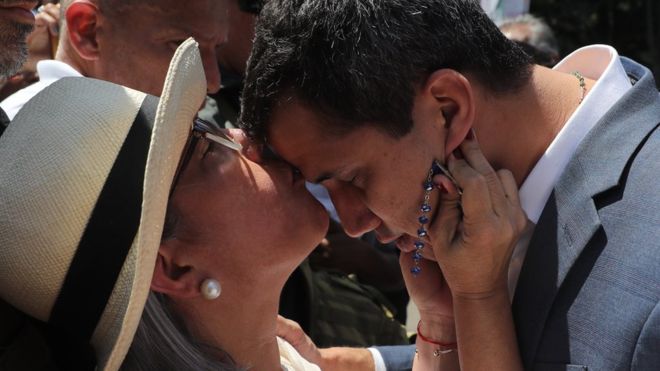The UK, France, Germany, Spain and other European countries have officially recognised opposition leader Juan Guaidó as interim president of Venezuela.
It comes after President Nicolás Maduro defiantly rejected the EU’s Sunday deadline to call snap elections.
Mr Guaidó declared himself interim leader last month and won US backing.
Russia – a backer of Mr Maduro – accused EU countries of meddling in Venezuela’s affairs.
As pressure mounted on Mr Maduro to step down, he said he could not rule out the possibility of civil war.
In a TV interview, he warned that US President Donald Trump would leave the White House “stained with blood” if he intervened militarily in the crisis, which arose after Mr Maduro’s disputed re-election last year.
Mr Guaidó said on Sunday he would build an international coalition to deliver humanitarian aid to Venezuelans.
As head of Venezuela’s National Assembly, Mr Guaidó says the constitution allows him to assume power temporarily when the president is deemed illegitimate.
What have EU countries said?
Sunday saw the expiry of an ultimatum set by European countries including France, the UK, Germany and Spain for Mr Maduro to call early presidential elections. They said that they would recognise Mr Guaidó as interim president if no such pledge was forthcoming.
On Monday, those countries and and several other European nations officially recognised Mr Guaidó as interim president.
“UK alongside European allies now recognises @jguaido as interim constitutional president until credible elections can be held”, Foreign Secretary Jeremy Hunt said in a statement on Twitter.
UK Prime Minister Theresa May’s official spokesman said that “further steps” were being considered, including the use of sanctions, without outlining what form any possible sanctions might take.
French President Emmanuel Macron said Venezuelans had the right to “express themselves freely and democratically”, announcing his support for an EU contact group.
German Chancellor Angela Merkel told a news conference in Tokyo that EU countries expected Mr Guaidó to initiate a swift election process.
Spain’s Prime Minister Pedro Sanchez said Venezuela “should be the author of its own destiny.”
“The international community has a duty to help and ensure that this happens with the necessary guarantees”, he told reporters.
Other EU countries, such as Greece, have publicly backed Mr Maduro. The Greek government reluctantly signed an EU statement in January calling for fresh elections.
The country’s left-wing ruling Syriza party then issued its own statement expressing support for “the legitimate President of Venezuela, Nicolas Maduro” .
The Italian government – anti-establishment Five Star Movement and right-wing League – is divided on the issue,
Russia has slammed Monday’s statements, accusing EU countries of interfering in Venezuela’s affairs and attempting to “legitimise usurped power”.
Source: BBC




